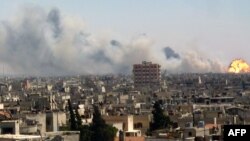Activists say at least 40 people were killed and dozens wounded in the central Syrian city of Homs when rocket attacks on a government-held district set off successive explosions at a weapons depot.
The Britain-based Syrian Observatory for Human Rights, an opposition monitoring group, said the number of casualties is likely to rise. Both soldiers and civilians are among the dead.
A video posted online by activists showed a huge fireball over Homs neighborhoods, causing widespread damage and panic among residents, many of whom are majority Alawite supporters of President Bashar al-Assad - who is of the same sect.
Local residents said the explosion was a rebel attack and that the sound of multiple blasts could be heard for over an hour as munitions detonated.
Earlier Thursday, Mr. Assad said he is confident his forces will prevail in the crisis.
In a message Thursday on Syria's Army Day, the president said without that confidence, the government would not have been able to resist what he called more than two years of aggression.
He spoke during a symbolic visit to the town of Daraya, near Damascus, once overrun by insurgents but now mostly retaken by his army.
The conflict in Syria began as an uprising against Mr. Assad's rule in March 2011, and later developed into a civil war, leaving more than 100,000 people dead. Millions more have been displaced by the fighting.
Both the government and rebels opposed to the president have accused each other of using chemical weapons during the conflict.
The United Nations said Wednesday that U.N. experts will travel to Syria "as soon as possible" to investigate three sites where chemical weapons have allegedly been used.
U.N. spokesman Martin Nesirky said one of the sites will be the village of Khan al-Assal on the outskirts of Aleppo. He did not name the other two locations.
Khan al-Assal has been a key front in the battle to control Aleppo, Syria's largest city. Both opposition rebels and Syria's government accused each other of using chemical weapons during battles there earlier this year that killed about 30 people.
The Britain-based Syrian Observatory for Human Rights, an opposition monitoring group, said the number of casualties is likely to rise. Both soldiers and civilians are among the dead.
A video posted online by activists showed a huge fireball over Homs neighborhoods, causing widespread damage and panic among residents, many of whom are majority Alawite supporters of President Bashar al-Assad - who is of the same sect.
Local residents said the explosion was a rebel attack and that the sound of multiple blasts could be heard for over an hour as munitions detonated.
Earlier Thursday, Mr. Assad said he is confident his forces will prevail in the crisis.
In a message Thursday on Syria's Army Day, the president said without that confidence, the government would not have been able to resist what he called more than two years of aggression.
He spoke during a symbolic visit to the town of Daraya, near Damascus, once overrun by insurgents but now mostly retaken by his army.
The conflict in Syria began as an uprising against Mr. Assad's rule in March 2011, and later developed into a civil war, leaving more than 100,000 people dead. Millions more have been displaced by the fighting.
Both the government and rebels opposed to the president have accused each other of using chemical weapons during the conflict.
The United Nations said Wednesday that U.N. experts will travel to Syria "as soon as possible" to investigate three sites where chemical weapons have allegedly been used.
U.N. spokesman Martin Nesirky said one of the sites will be the village of Khan al-Assal on the outskirts of Aleppo. He did not name the other two locations.
Khan al-Assal has been a key front in the battle to control Aleppo, Syria's largest city. Both opposition rebels and Syria's government accused each other of using chemical weapons during battles there earlier this year that killed about 30 people.

